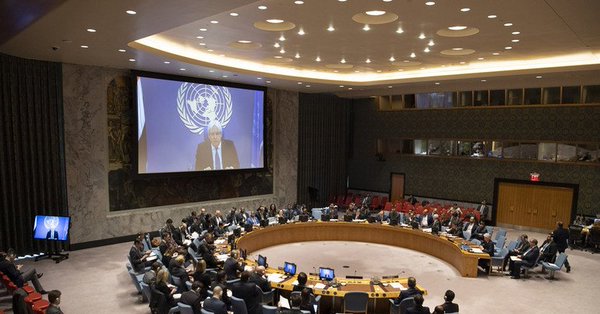
Security Council welcomes Yemen breakthrough, but lasting peace remains a ‘daunting task’
New York, Dec 15 (IBNS): Senior UN officials briefed the Security Council on the details of a UN-brokered ceasefire in Yemen on Friday in and around the key port city of Hudaydah, which is expected to restore a humanitarian lifeline to millions across the country, and kickstart imports of commercial goods.
Joining the Council via a live videolink from Jordan, Martin Griffiths, UN Special Envoy of the Secretary-General for Yemen, said that the talks, which concluded in Sweden on Thursday, saw the highest level of common ground ever established between the warring parties, during consultations to end the country’s brutal war.
Griffiths thanked the President of Yemen and the leader of the opposition Houthi delegation for their commitment to the consultations and expressed his hope that the commitments made in Sweden will be honoured. The UN, he said, has been asked to monitor the compliance of both sides to their ceasefire commitments.
The Special Envoy made clear that the agreement is a “humanitarian stop gap to save lives and turn the tide of war towards peace”, and that achieving the next steps towards peace will be a “daunting task.” Hudaydah, he said, is the “vital lifeline for the humanitarian programme upon which millions of Yemenis depend. The ghastly prospect of famine has made solving Hudaydah urgent and necessary.”
Yemenis facing ‘acute food insecurity’
Mark Lowcock, UN Under-Secretary-General for Humanitarian Affairs and Emergency Relief Coordinator, went into more detail on the dire humanitarian situation facing Yemenis, calling it a “terrible tragedy,” which is getting worse, with millions starving, sick and desperate.
Lowcock mentioned the recent publication of a report by a global partnership involving a number of UN Agencies, which confirms that much of the country’s population is living in a situation of “acute food insecurity”, with nearly a quarter of a million on the brink of starvation. Restrictions on humanitarian access, he added, are a serious and growing problem and the supply of food and essential goods must be protected.
The study makes clear that the ongoing war is the primary cause of the crisis, with the collapse of the economy also playing a major role. There has been some progress in this area, the relief chief added, with injections of foreign currency from Saudi Arabian and the United Arab Emirates stabilizing the exchange rate, financing imports of essential goods and enabling the payment of pensions and civil servant salaries.
Security Council welcomes outcome of talks, acknowledges ongoing crisis
In response to the briefings from the two UN officials, members of the Security Council welcomed the progress made in Sweden, whilst acknowledging the grave situation faced by the Yemeni people.
Friday, said Karen Pierce, Permanent Representative of the United Kingdom to the United Nations, was “a good day for all of Yemen.” Praising the work of Martin Griffiths, she said that “this is what the UN is for. The Council’s united support has helped Martin and the UN get to this point.” Mark Lowcock’s briefing was a “sobering reminder of the human consequences that are still at stake and of how many starving, sick and desperate people remain in the most vulnerable of situations,” she added.
The Permanent Representative for China, Ma Zhaoxu, pointed out that the ceasefire in the Hudaydah region was achieved ahead of schedule, helping to prevent further deterioration of the Yemeni economy and humanitarian situation. The talks, said Mr. Zhaoxu, have the potential to become a key turning point, and a fresh beginnin for a new political process that will help the Yemeni parties build mutual trust.Representing the United States, Ambassador Nikki Haley said that the breakthrough had come at a time of year which, for many people, is a season of hope: “we see a light in the darkness, and we hope that our best instincts can triumph over our worst. The world’s worst humanitarian crisis demands more than hope from the Security Council that peace will come to Yemen.” The Council, said Ms. Haley, has the ability to change the reality: “human beings created this crisis, human beings can end it. Life and death are on the line. And we are not powerless.”
Russia’s representative, Ambassador Vassily Nebenzia, also expressed hope that the talks have ushered in a new phase, which could end the war, and that further efforts will lead to a full ceasefire in the country, helping millions of Yemenis who are in need of some form of assistance. “The Rubicon that we have neared, as a result of the process launched in Yemen, now needs to be crossed” said Ambassador Nebenzia. “It is incumbent on us all to lend assistance to the Special Envoy.”
Support Our Journalism
We cannot do without you.. your contribution supports unbiased journalism
IBNS is not driven by any ism- not wokeism, not racism, not skewed secularism, not hyper right-wing or left liberal ideals, nor by any hardline religious beliefs or hyper nationalism. We want to serve you good old objective news, as they are. We do not judge or preach. We let people decide for themselves. We only try to present factual and well-sourced news.







